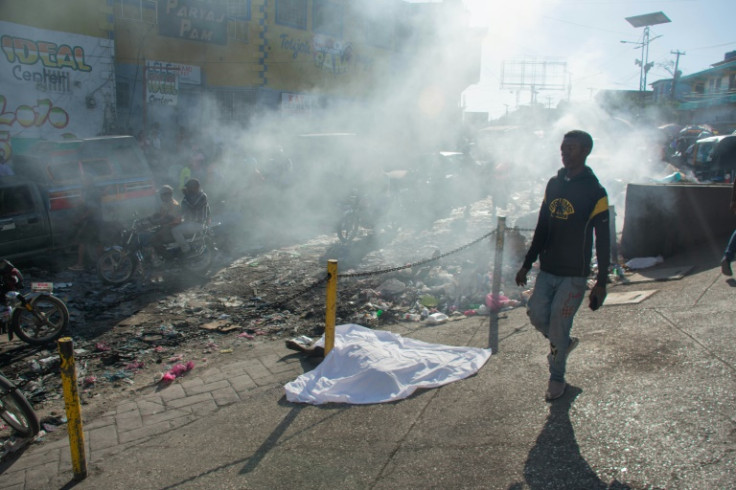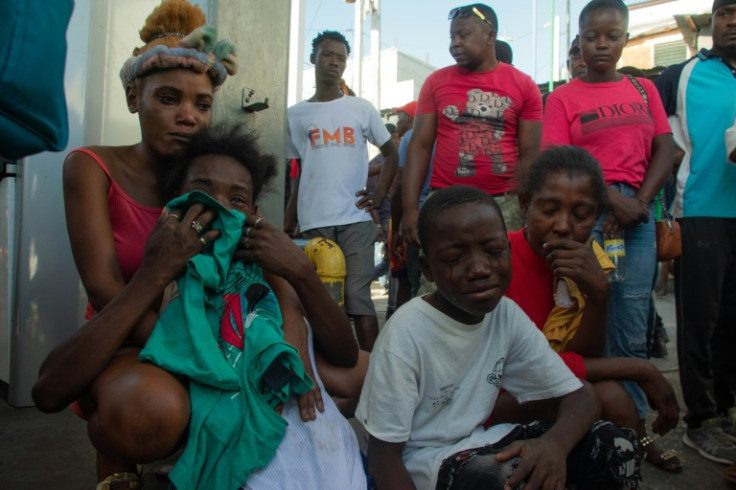Talks Push On In Haiti As Gangs Choke Capital

Negotiations to form a transitional council to govern Haiti advanced on Wednesday, as the United States airlifted more citizens to safety from gang violence that has plunged the impoverished country into chaos.
Haiti has been rocked by a surge of unrest since February when armed groups raided a prison, releasing thousands of inmates, as they demanded Prime Minister Ariel Henry resign.
Last week Henry agreed to step down and allow the formation of an interim government, but negotiations have been slow despite pressure from neighboring Caribbean countries and the United States.
"Discussions continue. I'm sure it will take a little bit of time, But from all indications, it's moving along," Guyana's ambassador to the UN, Carolyn Rodrigues-Birkett, said.
A Haitian government source told AFP that names for the council had yet to have been given to outgoing prime minister Henry as talks among political parties and others dragged on.
President Jovenel Moise, who appointed Henry, was assassinated in 2021 and never replaced. The council would name an interim prime minister to oversee the country's first elections since 2016.
Haiti's capital Port-au-Prince has been overrun by armed groups for weeks, with many police stations, power stations, public buildings and facilities attacked, and dead bodies left strewn in the street.
Intense clashes and shooting erupted Tuesday and Wednesday in the Petion-Ville suburb of the capital, according to residents, with locals barricading roads to protect themselves and stop gang access.
"I'm ruined," Gerard Vil, a street trader in the capital, told AFP. "I sold things in the center of Port-au-Prince. Since insecurity has skyrocketed, you can no longer sell there."
A nighttime curfew, due to end Wednesday, was extended until Saturday in the Ouest department, which includes the capital, the government said.
The violence has exacerbated an already grim humanitarian situation, with warnings of famine, malnutrition and the collapse of basic services.
The World Food Programme said roadblocks in the capital had impeded efforts to distribute food.
"We will do everything we can to help, but we need security and access," said the WFP's representative in Haiti, Jean-Martin Bauer.
Elsewhere, a policeman in the security detail for the prime minister's office was shot dead Wednesday, the force's union said.
The United States continued to evacuate more of its citizens, taking them by helicopter from Port-au-Prince to the neighboring Dominican Republic.
"We do expect these helicopter movements to make multiple trips in order to try and get as many American citizens as we can," State Department spokesman Vedant Patel told reporters.
Separately Wednesday evening, a rescue flight organized by the administration of Florida Governor Ron DeSantis carried 14 Americans from Haiti to the southern US state.
DeSantis said it would "probably be the first of many flights" for US citizens, according to local media.
Meanwhile, Haiti's PM Henry has been stranded in Puerto Rico since the gangs' coordinated attacks began while he was visiting Kenya, trying to nail down a plan for Nairobi to lead a UN-approved police force to restore order in Haiti.
The UN humanitarian agency OCHA reported Wednesday that medicine, blood bags and other supplies had been flown into Haiti, with health facilities severely affected by the violence.
The UN's refugee agency meanwhile issued a statement calling for the protection of Haitian migrants, urging countries "to not forcibly return people to Haiti, including those who have had their asylum claims rejected."
Though there has not been a mass exodus from the country, the United States has turned away at least one boat of migrants, warning those coming by sea face immediate repatriation.

© Copyright AFP 2025. All rights reserved.





















